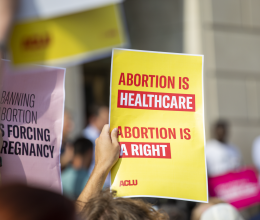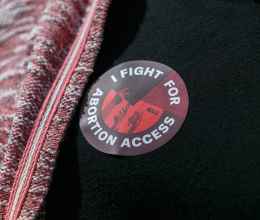Last Sunday, May 31, marked the 5th anniversary of the brutal murder of Dr. George Tiller, a physician who provided abortion services at his women’s clinic  in Wichita, Kansas. Tiller was the medical director of Women’s Health Care Services in Wichita, one of the very few clinics that performed late-term abortions. The morning of his murder, Dr. Tiller was serving as an usher at his church during the Sunday morning service. Tiller was shot in the head at point-blank range by anti-abortion activist Scott Roeder as he was handing out literature to fellow churchgoers.
in Wichita, Kansas. Tiller was the medical director of Women’s Health Care Services in Wichita, one of the very few clinics that performed late-term abortions. The morning of his murder, Dr. Tiller was serving as an usher at his church during the Sunday morning service. Tiller was shot in the head at point-blank range by anti-abortion activist Scott Roeder as he was handing out literature to fellow churchgoers.
Dr. Tiller was no stranger to the violence and intimidation tactics used by extreme anti-abortion activists. In 1986, his clinic, Women’s Health Care Services, was firebombed. In 1988, Tiller received word from the FBI that anti-abortion extremists were targeting him; this threat prompted him to protect himself by wearing body armor, both inside and outside of his practice. The body armor didn’t stop extreme activists from making attempts on his life. In 1993, Shelley Shannon shot Tiller five times while he sat in his car. Despite these threats and attempts on his life, Dr. Tiller continued to bravely perform abortion services. He continued to live by his motto, “Trust Women” – a motto that he proudly wore on a button fastened to his jacket lapel. Tiller did not waiver in his commitment to trust women, and he did not waiver in his commitment to respect women and treat women with compassion. While retelling her abortion story, April Adicks, a former ACLU of Kansas staff member, recounted her time as a client of Dr. Tiller. She called him “kind, soft spoken and caring.” Tiller treated Adicks without judgment.
Violence against abortion providers and abortion clinics isn’t new. The National Abortion Federation (NAF) has recorded a number of harrowing statistics on violence and disruption against abortion providers in the U.S. and Canada. Between 1977 and 2012, there have been at least eight murders, 17 attempted murders, 42 bombings, 181 arson cases, and 1,490 cases of vandalism against abortion providers. Clinic violence – both the threat and the reality – was one of the impetuses for clinic “buffer zone” legislation that create a buffer around abortion facilities and/or staff people. Three states (Colorado, Massachusetts, and Montana) currently have statewide buffer zone laws. The Supreme Court is currently deciding the constitutionality of Massachusetts’s buffer zone by way of McCullen v. Coakley. Arguments in the case were heard in January of this year.
After Dr. Tiller’s brutal murder, his family decided to close Women’s Health Care Services indefinitely. This murder left the city of Wichita without an abortion facility. One physician, Dr. Mila Means, attempted to incorporate abortion services into her family medicine practice, but her landlord, concerned about the potential for violence and disruption, refused to let her do so. A former associate of Dr. Tiller, Julie Burkhart, remained committed to reopening an abortion facility at the site of Tiller’s former clinic. In April of 2013, Burkhart and her colleagues opened South Wind Women’s Center with the goal of “re-establish[ing] access to full-spectrum reproductive healthcare in Wichita, Kansas.” South Wind does not perform late-term abortions. Burkhart and other clinics workers are regularly harassed by anti-abortion activists – both at the clinic and at their homes. Yet, despite these threats, South Wind workers, like other abortion care workers across the U.S., continue to trust women and respect the difficult decisions women sometimes have to make.
Trusting a woman and respecting her personal decisions is the key to keeping abortion safe and legal. Trust and respect is also the key to keeping abortion providers and women who seek abortions safe from harassment, assault, and other forms of violence at the hands of anti-abortion activists. Nancy Foss stated this perfectly in her recent letter to the editor in the Portland Press Herald: “Maine is a pro-choice state because we trust Maine women. We trust Maine women who are perfectly capable of making their own moral and responsible choices in the face of circumstances that they know best. We trust Maine women, and we applaud abortion providers who are there to support women and provide us with safe and compassionate medical care.”









